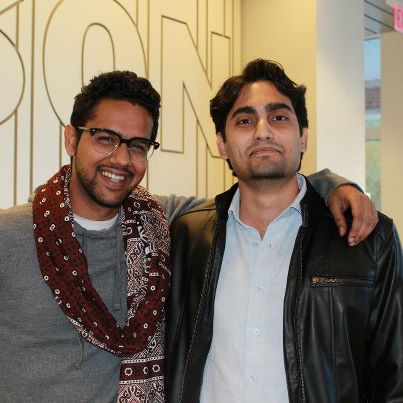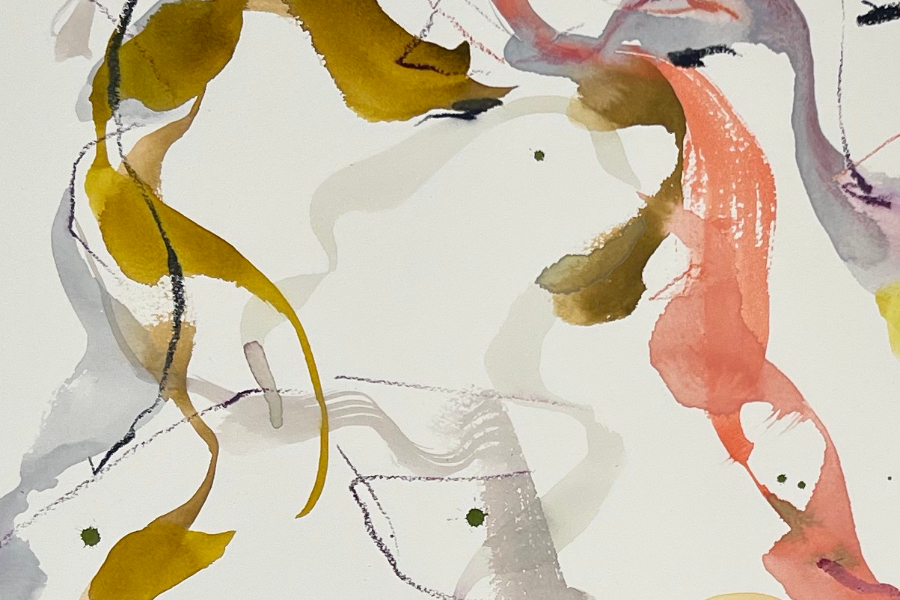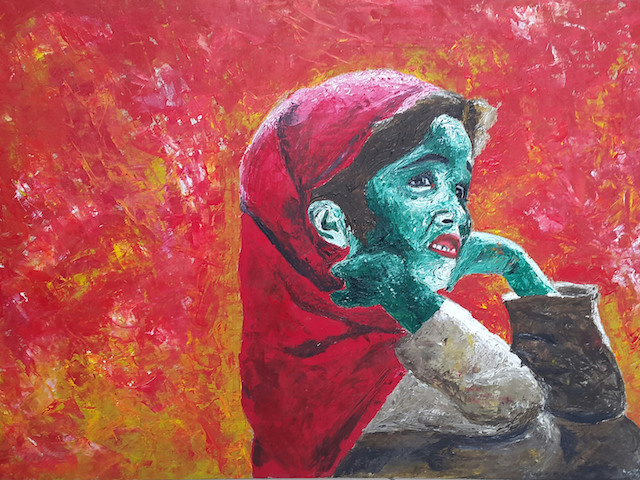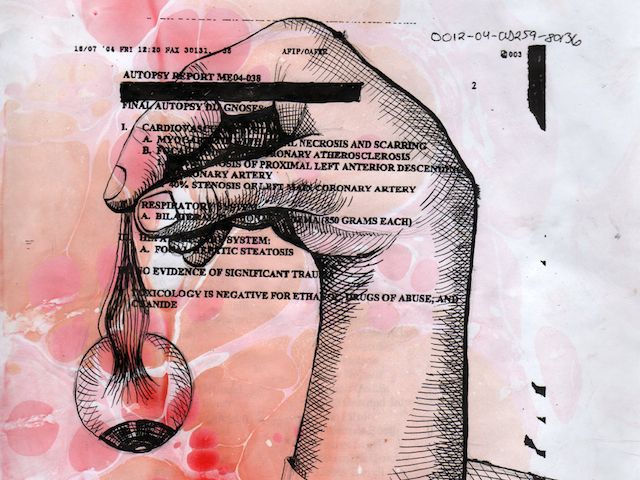The two comics chat with fellow comedian Jen Kwok about emergency generators, censorship, and the most-viewed YouTube video in Pakistan.

December 12, 2012
Danish Ali and Ali Gul Pir are two Pakistani comedians who recently toured the East Coast as part of Very Live through Center Stage, an initiative of the US Department of State administered by the New England Foundation for the Arts. Jen Kwok caught up with them at the end of their trip (a few hours before they boarded the plane back to Pakistan) to get their reflections on small town USA and what it’s like to stand a mere ten feet from Robin Williams.
Jen Kwok: Tell me a highlight of the trip for you guys.
Danish Ali: I was scared about coming to America. You have these irrational fears in your head—“Oh, I’m Pakistani, what are people gonna think?” So the best story for me was going to a restaurant and ordering some drinks and the bartender’s like, “Where are you from?” And I’m like, “I’m from Pakistan.” And he’s like, “No, what table are you from. I just need to know who’s paying for this.” That happened early on in the tour. There’s a big disconnect between how nice you guys are and how you’re portrayed in the media. I joke about how you guys need to fire your PR agent (laughs). And I think it works both ways, for Pakistan as well. So that’s been really nice, the human interaction versus what you see on TV.
Ali Gul Pir: I thought I would never get called by the State Department to perform in the US. But earlier this year, we got an email and they said, “You were selected,” and I was really excited. I’ve performed over eighty shows in Pakistan, but never outside Pakistan. It’s my first trip to the US as well. I was looking forward to the performing, as well as interacting with people.
When we came over, Hurricane Sandy had just [hit]. So we saw, like, forty cars in the line for gas—and that’s what we have weekly [in Pakistan].
Danish Ali’s “US Election” video.
D: We’re like, “Oh it’s like we’re back home. Oh, and the electricity’s out? It’s just like Pakistan!”
J: For us, we’re like “What do we do?!”
D: We could have brought our generator. We have a UPS—you probably don’t even know what a UPS is. Uninterrupted Power Supply—every Pakistan household has one.
A: [The] next morning, we drove all the way to Hanover, which is a five-hour drive, but we stopped in Connecticut and different places.
J: So you guys went through all the small towns as well.
D: Yeah, just driving around. We stopped at Radio Shack for hours, trying to get our cell phones to work. When I got here, my Pakistani cell phone service sent me a message saying “Welcome to Armenia.”
J: It’s the Kardashians’ America. So it is kind of Armenia (laughs).
D: I was worried what my roaming bill would be, if it were in Armenia.
J: Did you guys feel pressured that you had to represent your country when you performed here?
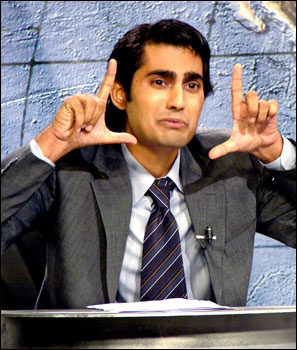
D: I’ve been doing stand-up comedy there for seven years, I have a TV show there and performed internationally before. So the comedy part comes naturally. It was mostly the “What-it-would-be-like?” thing. As a stand-up comedian, I got a test group together to try out my material, so that was fun. I have an hour-long set there that I’m used to doing, but here it’s like I’m a baby again, because those jokes don’t translate. I can’t go, “So what’s the deal with Karachi buses?”
A: For me, the performance bit was the bit that I was worried about. The interaction, not so much. Because at the end of the day we’re all people. I didn’t feel like I’m gonna talk to someone and somebody’s gonna be like, “What are you—why are you talking to me?” There were some people, like in small towns, [where] this is how we were introduced: “Two Pakistani comedians—if you don’t laugh, they’ll bomb you.”
J: He was joking, right?
A: That’s the point. Some people are so careful about these things. And in some places, people are so innocent that they say [things] like, “Oh thank you, these Pakistani Indian comedians.” We didn’t take offense to that; we were like, okay, this is a person who doesn’t know the difference.
J: Did you notice a difference between New York versus more rural areas?
D: I think they were less politically correct in areas outside of New York.
A: In places like Providence we didn’t see even a single Asian person. So I think they were just not aware of what things to say or not to say. They have their own bubble, it’s a small community—if someone’s at a Radio Shack and any random guy walks in it’s like, “Yeah, Dave, how are you doing?” The guy knew everyone in the town.
J: So you guys come in and they’re just like, “We have no idea what to do.”
A: But they’re really welcoming.
D: And it’s such a privilege to get to know your country while on stage. I mean, we get to know America through what you guys are laughing at. Not everyone is gonna experience that. So that has been very cool.
J: How do you think that’s gonna change your guys’ process when you go back?
D: For me, it’s quite drastic. We watched our Hollywood movies, the news, but the personal connections with human beings that we’ve made here—that is going to affect my work. If I’m talking about America now, it’s more than just a knowledge base, it’s a feeling base.
A: I hadn’t been out of the continent for the past fifteen years. Taking this tour (and me being twenty-six), it just opens up your mind to a 360-degree thought process. Back home, you’re just taking from one point of view: if I do this, this will happen. But when you come here, you start questioning everything that you believe, because that thought process might not apply here. At the same time, last night, I was walking down the street and this couple was like, “How come you don’t hang out with my friends?” and, “Your friends are really boring.” We have the same problem back home. So it’s nice to see that we all have relationship problems.
D: You think in your head, “Oh, it’s a foreign country, it must be so foreign.” But pretty much, everything’s the same. Like, when you saw The Colbert Report [on TV], these people were gods, but when we went there, we started noticing the similarities between my studio and his studio. The only difference is when we waited outside The Colbert Report. We used to do Pakistan’s first English-language comedy TV show, [which] was shot with a live audience, and getting those audiences in that studio was a nightmare, because there’s some dude burning tires outside, protesting. But we’re standing in line at Colbert, and nothing happened.
J: Is there censorship? How does that affect you guys in Pakistan when you try to express yourself politically, comedically?
D: I was censored just a month ago on my TV show. Having said that, it’s not that bad at all. The Pakistani media is its own institution in Pakistan. There’s a hundred channels, almost. And so they influence all the other institutions now. It’s an exciting new check-and-balance. Musharraf, when he came to power, one of the first things he did was launch that satellite for cable television. He knew he was opening Pandora’s box, because before then no one had ever challenged the state. There were three channels, all owned by the government. And now suddenly there are all these other voices and they’re like, “No, I hate you and I hate this politician, and I hate this guy.” So these journalists, they’re really gutsy.
Ali Gul Pir’s “Waderai Ka Beta.”
A: You can’t talk about religion, terrorism, and the military. But, there are some things that nobody has spoken about. Like, the song that I did, “Waderai Ka Beta,” about the feudal system in Pakistan. We have feudal lords who own a lot of land, have slaves and money, and their sons live in big cities and go to big schools. They can do whatever they want; there’s no accountability. Most of these people are our politicians because [they] have all the power. So when I made a song about those people, I took it to channels. They wouldn’t play it. There was no [actual] censorship policy against making fun of feudal lords. They just didn’t want to touch that subject because they felt that they would be threatened. But that’s why we have Internet. I put it up, and so far we have 4.5 million views. And that’s a record in Pakistan. No made-for-Internet video has achieved 4.5 million in Pakistan. So that’s what happens—you can’t censor the thoughts of people, if you can find a way to get your video to them. If they like it, they’re gonna own it. And after that, every TV channel started playing it.
D: Internet has been a big factor in Pakistan. Politicians are now advertising on Facebook.
A: We have a TV ratings system which is very shady. But on YouTube, you can see every individual view, and you can’t debate against it, that “this is the wrong count.” There was a line [in my song] that said “saen tou saen, saen ka kutta bhi saen,” which meant “master is a master, but even the dog of the master is a master as well.” That phrase really caught on, to the point that if our Prime Minister’s son was caught in a scandal, [news anchors] would be like, “Master is a master, but even the son of a master is a master.” It became a thing that associated itself with the oppressors of our country. As long as we have free mediums like Internet—you either block the whole site or…
D: Which they have tried to do in the past. They’ve tried to shut down Facebook a couple of times.
A: We have no YouTube right now! It’s been over a month now.
D: There was an offensive video against Islam, and so, obviously, all Muslims were like…
J: The movie that was made here [Innocence of Muslims]?
D: Yeah. That is like hate speech to us. You see, things like this—this is the only thing crossing over there, unfortunately. If you come here, you’re so nice to us. This [trip] will never make national headlines, unfortunately.
A: Because, controversy sells. International media is looking for…
D: Maybe we should just slap each other, in a happy way? That’ll be more controversial. We need to do some happy controversy. Like, an intercontinental sex scandal. Petraeus needs to get a Pakistani in the mix. In a romantic, nice way.
J: (laughs) And he has like eight Pakistani love children…
D: I wish in that triangle there’s a cute Pakistani that emerges and saves the day. So [referring to the video], it’s on our minds now, this disconnect. People rioted. There was billions of rupees worth of damage from that video. But, there was also political motivation. A lot of the political parties there used it to wreak havoc. But, by and large, obviously Pakistan is against that video. And, all we asked for is to block that video. So, we could keep using YouTube. But, they didn’t.
J: Is there a comedy scene in Pakistan? Other comedians you all hang out with? Do the comedy club circuit?
D: The old-school vanguard, like Chevy Chase, Richard Pryor, we have those in Pakistan. They are legends. They were there in a time when Pakistan was very different, before the Afghanistan Cold War, in the ’80s. Our parents’ Pakistan was very liberal, very western. There were casinos, alcohol… now it’s prohibited, but then, they could sell it. There was a lot more tolerance. That vanguard of comedians was a golden era and we’ve inherited this sort of bastardized version of what that world was. It’s a privilege to be in this era, where we’re young and get to report on all these crazy things that happen in Pakistan. And there’re many other YouTube groups doing comedy—Pakistanis. So there is a burgeoning comedy scene. There’s money in it too. Because these hundred channels are only ten years old—they’re hungry for content.
J: Is it a coincidence that you two are both fairly political, or socially satirical?
D: It’s not coincidence. It’s more incidence. It’s more that we live there, so we have to be.

A: We have a legendary comedian called Umar Sharif, and he doesn’t focus on culture, he’s more of an observational comedian. He talks about relationships, the culture, rather than the society and its problems. Some Jon Stewarts there too. There’s a group of boys who pioneered that, doing a show called BNN—Banana News Network. It’s like The Onion. Everyone’s doing their own kind of comedy. At Dartmouth College, there were three different improv comedy groups. In Pakistan, there are four. And I’m counting the ones that weren’t there before. Blackfish was one of the first English-language improv groups.
D: Actually I performed with Blackfish. I started a few years before you, so I see improv [a little differently]. It’s been ten years now, since Blackfish. And that troop has spawned a lot of troupes. It spawned the next troupe I was in. And it was sponsored by McDonald’s and we did a three-city tour of fifteen shows, all sold out. So, I think improv is now here to stay.
A: But the majority of Pakistan, they don’t know what improv is. It’s new ground. Danish was part of a group that did improv in English, and then there was another group he was part of that also did it in English. In our country, maybe 15 to 20 percent of the people watch English shows. My group was the first Urdu (which is our national language) improvisational comedy. I think whatever comedy you do, you should do it in your own language. Because if you don’t, the majority of the masses will not know what you’re doing.
J: Because there’s this additional barrier: “I have to understand English and I have to understand that they’re trying to do this new comedy art form. I don’t understand.”
A: Exactly. Because the English-speaking people are like a bubble. They don’t represent the majority of the nation, who don’t watch English content. So that’s been my aim, to do whatever I do in Urdu. When I’m on the TV show and I get a call from a person who is a cab driver in a certain village in [another] part of Pakistan, it’s a big honor for me—because that means I’ve crossed that barrier. Because I have a rural background as well.
D: Also, financially, it’s a better option. We started our show in English, but the new show we do is in Urdu. Because you reach the masses, and you’re paid according to that also.
J: Do you think that there is a balance between how you write when it’s for the English-speaking audience [and when it’s for an Urdu-speaking audience]?
D: When you’re doing an English show, your audience is broader, so you balance it. When you’re writing in Urdu, it’s local stuff—your knowledge base is stronger, and you can be a little sillier [because] you know the references. But, I don’t think your voice changes.
A: I don’t write stuff in English when I work there. I work in Urdu. Everyone I know speaks it; it’s the language I speak when I go out in the market. So that’s the language I do comedy.
J: What are the other shows that you guys did [here]? Did you do any in the city?
A: UCB [Upright Citizens Brigade] East.
D: Yeah, [that] was a lot of fun. I also performed at the Friars Club, which is really special to me. It was a small gathering. But those pictures on the walls, just enshrined—Robin Williams smiling next to Donald Trump and Jerry Lewis and Kirk Douglas and all these really old photos. [They] look like they were my age.
J: When they were starting out.
D: Yeah. Jerry Seinfeld! There was a photo there; he looked like [he was] my age. And they’re all kind of smiling at you while you’re onstage. And then performing to that crowd—stiff-collared, Friars Club, member-only. It was a tough gig, and they laughed. I’ll take that back home with me. Friars Club, where Jerry Seinfeld used to perform when he was young.
J: Who are your influences?
D: For me, it’s those people that I saw at the Friars Club. My first stand-up comedian that I saw on the Internet was Robin Williams, when I was sixteen. And I saw Eddie Murphy—a funny clip from his “Delirious” act. He used to do it in red leather. That whole guard of American comedians—that was it, I was hooked.
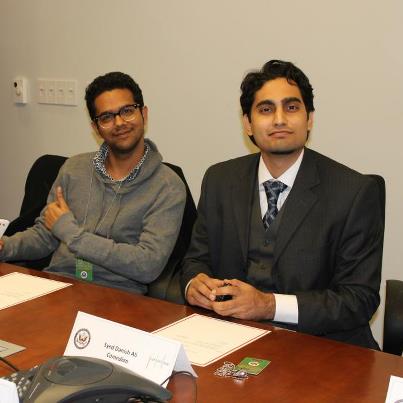
J: Did you guys see Robin Williams here?
D: It was part of the New York Comedy Festival. He made eye contact with me twice; he was ten feet away. And you know, I started doing stand-up because I saw a funny clip of his on someone’s computer!
A: I grew up watching Seinfeld. So that was my first dose of comedy. After that, there was a Pakistani show called 50/50, which was our SNL. It was very old; it doesn’t air right now. But it was one of the classic comedy sketch shows.
D: If you could subtitle it, I would recommend it to Americans. They are so funny, even though the references are somewhat local.
A: There was another comedian, Moin Akhtar, who passed away earlier this year. He was one of the few people who did clean, good, intellectual comedy. That was something that I was moved by—that feeling of making people laugh. There were times when I could’ve [given up on] comedy. Because in Pakistan, everybody lives together, the grandparents, the kids, the dad. Two years back, I told my mom that I have to experience things on my own, and earn my own living. So I left and started doing a little TV and theatre, but nothing was working out. For two months, I had no electricity. But not for a second did I think I should not do comedy. Because I got the pleasure of performing to a very good crowd in college. And in that crowd, I met an 80-year-old lady who said, “I haven’t laughed like this for god knows how many years.”
D: The universal desire to be a struggling artist (laughs) is apparently the same in Pakistan. I went to school to be a doctor and gave that up to do comedy full-time. I was on TV while I was in med school. So it was tricky balancing that.
J: At one point, did you think that you were just going to be a doctor?
D: I still do. Am I really doing this now? I mean, every year that I did comedy, whether for TV or stage, it’d be like—okay, now it’s not gonna work, so, I’m in med school. And then the next year—now it’s definitely not gonna work. But then it was final year, and then I graduated, and it was like: Now you need to man up and just do what you think is right.
A: I think it’s universal—if you work hard and you’re committed to your cause, you make it. After two years, I got an award from Google as an innovative hero. The Chief Minister of Punjab gave me that award through Google.
D: (laughs) Can you believe that Google gave you an award, even though they own YouTube?
J: Where do you guys see yourselves going? Where do you want your comedy to go?
D: I want to be the big Pakistani international comedian. I want to export happiness—that should be a Pakistani export. If I can be lucky enough to be that guy for Pakistan, that would be mission accomplished. My dad gave 39 years to the military in Pakistan, so I wanted to join the military. Then I tried to be a doctor, but then I was like, maybe through comedy, I may have that certain something that lets me get there. So that’s my goal.
A: My goal is more local. If I can lead a good life entertaining the people of Pakistan, that’s good enough for me. For these people who make 6 or 5,000 rupees, which is $50, $60 a month, it’s crazy, how they’re surviving. These are the people who need a break and watch something and have a good laugh. I want to be the best entertainer for them.
J: One more question: Are there women who do comedy [in Pakistan]?
A: There’s this Queen of Comedy, Bushra Ansari. There’s female comedians who’ve been around for a long time, and they’re still working, doing great work. Nobody should hate you for making people laugh. Nobody’s gonna discourage that. The only pressure a person faces is through family. Everybody expects you to be a banker or engineer or doctor. Nobody’s gonna be like, “Comedian, that’s the one.”

